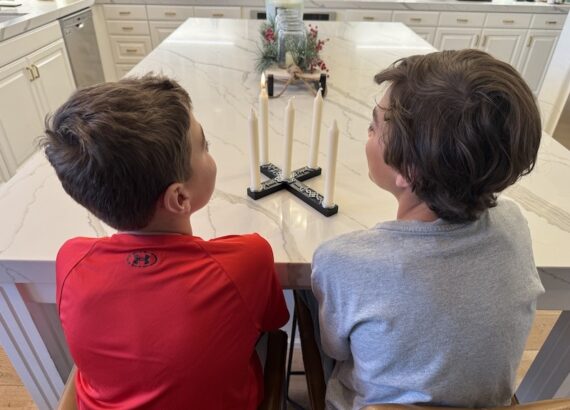Advocating For Your Rare Child’s Education

I had the pleasure of being a speaker at the National Organization of Rare Disorders (NORD) Living Rare, Living Stronger Forum. The topic I was privileged to speak about was “The ABCs of Advocating for Your Child’s Education,” a topic near and dear to my heart! Helping my child access his education was another aspect of rare disease life, among many, that I had to learn.
Like everything else in the rare disease world, helping our children access their education can feel like an overwhelming and daunting endeavor. It can require us as parents to learn a whole new system, the education system. I want to encourage you that while it can feel overwhelming and require many steps initially as you put things in place, it does get easier. All the time spent upfront educating ourselves can lay the foundation for a successful future of learning, in whatever way, shape, and form that may look like for our child’s unique needs. Here are some tips to help you advocate effectively and set your child up for success in the school years ahead.
Parent’s Role
I think it’s important that first, we understand we as parents are essential members of our child’s education team. We are our child’s first and best advocate, and we know our child the best, so we have valuable insights to contribute.
Our role is to represent our child and speak on our child’s behalf, knowing what only we, as a parent, can know. The good news is that school districts want us to be involved members of the team. It’s welcomed. We need to go in knowing that this is our role. We are a welcomed, instrumental, and essential part of our child’s educational team.
Educating Ourselves
We can be valuable team members by educating ourselves as best we can about our child’s condition and needs. The truth is that most often, we, as parents, don’t understand all the ins and outs of special education. We may not understand all the terms, procedures, and laws. Special education is most likely not our area of expertise. But, we are the experts of our child. That’s what we can bring to the table.
We can learn as much as possible about our child’s condition and how that condition impacts their ability to access their education. That’s the piece we can offer as a team member, and it’s a vital piece.
Because we are dealing with rare diseases, it’s common to find that our child’s school district may not be familiar with our child’s diagnosis and how it impacts their learning. Therefore, it’s our job as parents and advocates to inform and educate the school district as best we can.
Instead of assuming that the school district understands our child’s condition and needs or that through the assessment process, they will be able to glean all they need to know; we will make no assumptions and instead proactively provide them with the required information.
So If it’s at all possible, I recommend doing upfront research on the types of accommodations, modifications, and services that are most often recommended for children with your child’s type of disease. Now I recognize that this puts more legwork on us as parents. I also know it comes with a significant learning curve, just like most aspects of rare disease, and that’s difficult because we all have so very little time as it is, but I assure you that this will be worth your time.
Gaining this type of knowledge will help prepare you for meetings and conversations with the school district, and it’s going to help ensure that your child has what they need.
We, as parents, are going to have to do some research upfront so that we go into IEP and 504 meetings armed with information. So, where can we find this information?
- If there is a foundation or an organization for your child’s disease, see what they recommend for school accommodations, modifications, and related services.
- If you know other parents whose children have the same condition, see what types of accommodations and modifications they have in their plans, see what’s working, or see what they recommend.
- Or, in cases where your child’s diagnosis is ultra-rare, or there isn’t a foundation or organization to provide resources, or you don’t know other parents whose children have the same diagnosis, you can research the symptoms. For example, if your child’s condition causes fatigue, you can research the types of modifications and accommodations made for students with fatigue, whether it’s assistive technology devices, permitting extra time on assignments and exams, alternative PE, and things of this nature, etc.
Even though this takes work on our part as parents, gaining this knowledge is going to help us build our confidence in this area and allow us to have informed conversations and dialogues with the education team
The more educated we can be stepping into these meetings, the better outcomes we’ll have coming out of them. So do your homework and figure out what plans and services may be helpful for your child. This will be a great foundation for starting these conversations.
Educating Our Team
Now that you’ve educated yourself, you can educate your child’s team. Your job is twofold: to make the school administration understand your child’s condition and how it affects their ability to access their education, and to effectively state and build a rationale for the services your child needs. Okay, so let’s unpack this.
Typically, the school will do a full assessment on your child, and then based on the findings of that assessment; they’ll recommend plans and services. But the reality is that it may be challenging to get the complete picture of a child in an evaluation. So there may be some information gaps. We, as parents, can help fill in those gaps.
You may need to help the school administration understand your child’s condition and how it affects their ability to access their education. Perhaps this is the first time your school administration has come across your child’s diagnosis. Or maybe your diagnosis is understood but can present itself in various ways. Make no assumptions. Take the time to lay out precisely what it is your child is dealing with and how it specifically affects their education, their school day, and their ability to keep pace with learning. Point out how the diagnosis specifically affects their ability to learn from a mental, physical, and emotional standpoint. This allows the education team to see the full picture of our child. Every child is different and has unique nuances, so this will be extremely helpful in identifying the areas of need.
Instead of lumping your child into a category, the school will need to see your child for the unique person they are. One thing that I recommend and that many parents find helpful is to put together a physical document all about your child. This document can outline your child’s condition, how their condition impacts learning, its implications on navigating the school environment, social and emotional issues, the type of equipment your child uses, if any, etc.
I have a sheet I put together called “Introduction to Miles.” Putting all of this information in writing is a great way to give someone the ability to spend time with it and refer back to it.
Another idea parents find helpful is to create a “brag sheet” about their child. Since you’re the expert on your child and you were gathering intel and insights long before school, it’s a great opportunity to share what you know. Your child comes to life off the pages of an assessment, bringing them from black and white into color. It allows the administration to see the complete picture of your child. These two documents can include things like:
Introduction Sheet
- Overview of the condition
- How the condition specifically affects your child
- How it specifically affects learning or accessing education
- Tools and equipment your child uses
- Curriculum accommodations and modifications needed
Brag Sheet
- Photos of your child
- A vision statement (of what you want for your child)
- Your child’s likes and dislikes
- Your child’s learning style
- Things your child is working on
- Strengths and weaknesses
- Areas for growth
- What works and what doesn’t work for your child
In addition, to you providing this type of information, you can also request letters from your child’s doctors, specialists, and therapists outlining this information, so then it is coming from professionals and experts in these areas.
With Miles’ diagnosis of SMA, there is often confusion as to what type of plan children with SMA should have. In order to take away any confusion, I did my research and put together one motherlode of a packet of information stating what a child with SMA and what Miles specifically would need to attend school. The packet contained letters from medical specialists, OTs, PTs, as well as school best practices from the foundation for Miles’ disease, and from other children with the same diagnosis. It was my arsenal to help inform and collaborate.
In short, you’ll want to use these tools to help give the school insight into your child. Any factual information you can provide will give your team the ammunition they need to substantiate services. Help them, help you.
Collaboration
After providing your administration with all of that valuable information, the school will do a full assessment of your child. Then based on the findings of that evaluation, they’ll recommend services.
You’ll want to make sure their findings line up with what you believe your child needs. Of course, you don’t want to offend your evaluation team by doing their job for them, but instead, you’re acting as an informed member of the team being able to come to the table and state what you feel your child needs based on you knowing your child best, and you having done your research.
The IEP or 504 meetings where you discuss findings, placements, goals, and services should be a collaborative endeavor with all parties working towards the same goal of making sure all your child’s needs are addressed.
Effective Communication & Advocacy
If we truly want to be a collaborative member of the team and advocate effectively, then we need to be mindful of the way we communicate with our school district. We have to keep in mind that this team will be responsible for implementing services and facilitating our child’s education. We don’t want to make them our adversaries; we want to make them our allies. We want to make them our partners.
We are going to be in continual communication with our school district. So If we truly want to serve our children, we have to communicate effectively with their education team to have successful outcomes.
Here’s the thing about advocating: it’s a balance. The best way to explain how we need to communicate and advocate is to be assertive but diplomatic. If we’re shy, we’ll need to find our voice. If we’re aggressive, we’re going to need to find our diplomacy. See my article on that here.
There will be times when we may disagree with assessment findings or the recommended services, or there may be times when we need to ask for more services, or times we need to speak up because the services and plans that have been put in place aren’t working.
I believe that it is our job as parents to advocate in these instances. But often, these situations can well up all sorts of emotions within us. Because we care so deeply about our children and so desperately want them to have what they need, it can be upsetting when we feel they aren’t getting it.
But, we’re going to have to take our emotions out of our advocacy and speak and act from a place of fact, not emotion. So, let all that emotion fuel you forward but let all that knowledge you’ve gained be your mouthpiece.
Enlisting an Advocate
Another route you can go, if you find yourself in over your head, is enlisting an advocate. An advocate can attend meetings with you, decipher the information, speak on your behalf, etc. You can ask around and find out if there’s a good special-education advocate in your area. They can represent you and help you get what you need.
You’ll want to ensure that your advocate is familiar with your state’s special education policies because the state governs special ed laws. It would also be extremely beneficial if your advocate has a good working relationship with key people in the local school districts, including principals, teachers, and special education coordinators.
Here are some ways to find an advocate:
- You can ask other parents, families, and friends, specialists who work with your child,
- Your state’s Parent Training and Information Center
- Your state’s department of education
- Your school district’s Special Education PTA or Parent Advisory Committee
- Nonprofit organizations serving people with disabilities
In closing, I want to encourage you that although this may feel like a lot to tackle, it will be worth the investment of your time. Your advocacy in this aspect of your child’s life can lead to a positive experience with learning and years of enjoying their education.
You got this, mama!









Comments
Trackbacks & Pingbacks
[…] For more tips on how to advocate for your child’s education, click here to check out the post “Advocating for Your Rare Child’s Education” […]